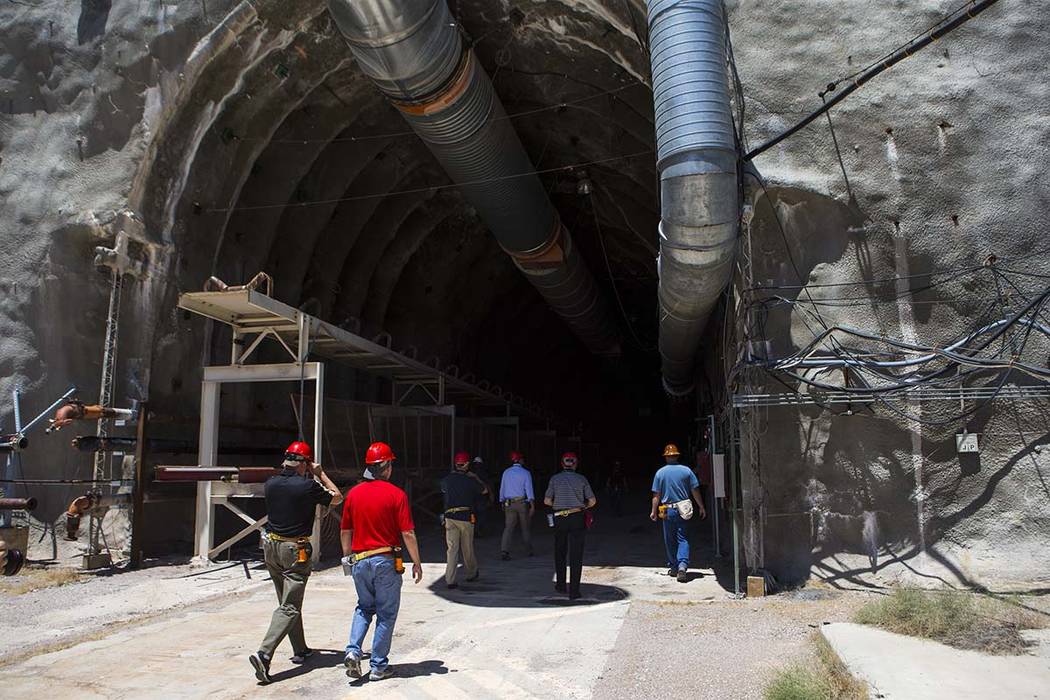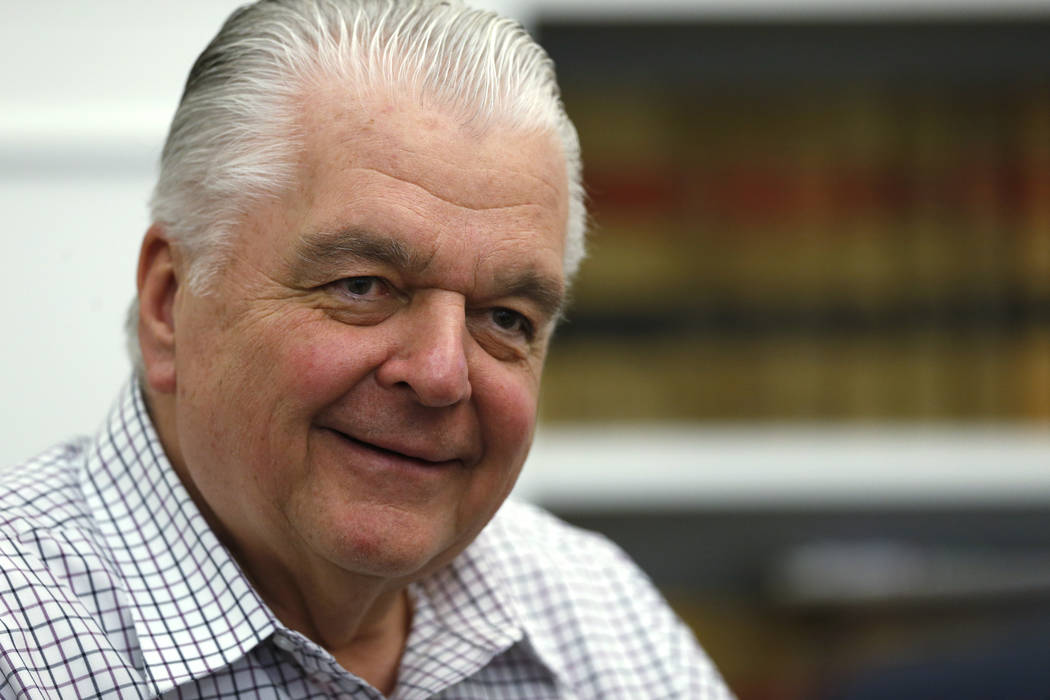Nevada braces for renewed fight over Yucca storing nuclear waste
WASHINGTON — A concentrated effort in Congress to address the growing national stockpile of nuclear waste is underway and Nevada is bracing for a wave of new legislation, and efforts to bury radioactive materials in the desert north of Las Vegas.
Two bills are moving through the Senate that would open Yucca Mountain as a permanent waste repository.
Similar legislation is expected in the House as early as this week as key committees weigh a Trump administration budget request of $116 million to process the Department of Energy license to open the Nevada site.
“Safely disposing of nuclear waste is a national problem. It requires a national solution,” said Sen. John Barrasso, R-Wyo., who dropped a Senate bill to expedite development of Yucca Mountain.
Another bill was filed by Sen. Lamar Alexander, R-Tenn., and Sen. Dianne Feinstein, D-Calif. It would push for interim storage facilities in other states while Yucca Mountain is developed.
Last week, Nevada officials in Carson City and Washington were united in delivering their message that federal and nuclear energy industry efforts to dispose of waste at Yucca Mountain are unfair to Nevada, which does not produce or use power generated by the plants.
Nevada Gov. Steve Sisolak, a Democrat, told a Senate committee that his position is the same as his Republican predecessor and “identical to the position of the past five governors.”
Sisolak urged Congress to seek alternatives in its quest to resolve the nuclear waste problem.
A concentrated effort
In Congress, Sen. Catherine Cortez Masto, D-Nev., said “our delegation is working together in both Houses.”
It will take a concentrated effort by the Nevada delegation, which huddled last Thursday, to stop the bipartisan push by lawmakers who represent states and cities where nuclear waste is currently stockpiled.
Yucca Mountain was designated by Congress in 1987 as the sole site for permanent nuclear waste storage. That law passed when Nevada was weak, politically.
The rise of Sen. Harry Reid, D-Nev., to Senate majority leader halted the development of Yucca Mountain and resulted in defunding the Department of Energy office that headed the license application process needed to receive a building permit from the Nuclear Regulatory Commission.
But the political landscape has shifted significantly in the past decade, with Reid, Gov. Brian Sandoval and Sen. Dean Heller, all staunch opponents of the repository, now out of government.
Pelosi holds the cards
Only Rep. Dina Titus, D-Nev., remains as a legislative veteran who has fought to stop development of the repository on Capitol Hill. She’s leading efforts in the House to block Trump’s funding request and pro-Yucca Mountain lawmakers who want to revive the process.
Titus, part of the Democratic whip operation, is in contact with House Speaker Nancy Pelosi, D-Calif., and other key leaders on influential committees who will oversee funding and authorization requests.
“At the end of the day, Pelosi holds the cards,” a congressional aide said.
Titus and Cortez Masto also filed legislation in the House and Senate to require the consent of state and local governments and tribal leaders to build a national repository. A similar bill by Titus died in the House in 2017.
Meanwhile, a new cast of political players from the state has emerged to oppose the concentrated push to transport the nation’s nuclear waste through Nevada and store it permanently below Yucca Mountain, located about 90 miles northwest of Las Vegas, which attracted 42 million visitors in 2018 alone.
In addition to Sisolak, a former Clark County commissioner who opposed Yucca Mountain from that elected position, Sen. Jacky Rosen, D-Nev., who fought development of the repository as a congresswoman, testified against a Senate bill to revive licensing procedures.
All roads to Yucca
During a hearing last week on the bill by Barrasso, to push permanent storage of nuclear waste in Nevada, Rosen argued that the stockpile of spent fuel and material has become so large that transportation would mean daily truckloads of hazardous material through Las Vegas for years.
Rosen was challenged on her facts by the staff of Rep. John Shimkus, R-Ill., whose House bill in 2017, passed by an overwhelming bipartisan majority, increased the capacity of waste storage at Yucca Mountain from 70,000 metric tons to 110,000 metric tons.
Staffers pointed out that transportation routes of waste to Yucca Mountain have yet to be developed.
But Nevada officials noted that because of Yucca Mountain’s location, there are few routes available for the waste to travel without passing through Las Vegas and Reno, a major point in the state’s opposition.
Despite overwhelming opposition by the state to the Yucca Mountain project, officials in the host county, Nye, support the resumption of the licensing process to determine if the site is safe.
The county wrote a letter to the Senate Committee on Environment and Public Works urging support of the Barrasso bill. “It’s the right thing to do.”
“We want decisions to be made on Yucca Mountain to be based on facts and science and not empty rhetoric and fear mongering,” said Leo Blundo, a Nye County commissioner.
Nuclear energy industry officials, and the National Association of Regulatory Utility Commissioners also urged the Senate to adopt the Barrasso bill.
Long-overdue contract
Anthony O’Donnell, a Maryland Public Service commissioner and chairman of the commissioners’ group, said the federal government is 21 years in default on the contract to take control and management of nuclear waste, resulting in fines of about $2 million each day — a remarkable cost to taxpayers.
“The history of the federal nuclear waste program has been dismal,” agreed Geoffrey Fettus with the Natural Resources Defense Council, but with an entirely different outlook.
Fettus warned that efforts to restart the Yucca Mountain licensing process over continued opposition by Nevada, tribal leaders, environmentalists and business groups, will “lead to years of litigation, and thus derail needed efforts to find disposal sites.”
The state of Nevada has pledged substantial funds to challenge Yucca Mountain on legal fronts.
Cortez Masto said Nevada lawmakers are trying to persuade their House and Senate colleagues to end the “boondoggle” of spending millions on Yucca Mountain and move forward to find other sites and address the growing stockpile of nuclear waste.
Contact Gary Martin and gmartin@reviewjournal.com or 202-662-7390. Follow @garymartindc on Twitter.
Yucca Mountain nuclear waste repository
1987: Congress designates Yucca Mountain as site for permanent storage of nuclear waste.
2002: Bush administration directs Department of Energy to apply for license to build a repository in Nevada.
2008: Department of Energy applies for a license with the Nuclear Regulatory Commission.
2010: Department of Energy seeks to withdraw the application, which is denied by the NRC.
2012: Congress slashes all federal funding for the project.
2013: D.C. Circuit Court of Appeals orders NRC to continue review of application with existing, unspent funds.
2017: Trump administration requests funds to revive licensing process, approved by House and killed in the Senate.
2018: Trump administration funding request for licensing again fails in the Senate.
Sources: Nuclear Regulatory Commission, U.S. House, U.S. Senate.
























